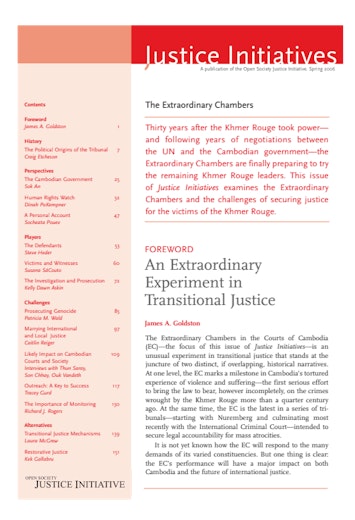Justice Initiatives: The Extraordinary Chambers
Thirty years after the Khmer Rouge took power—and following years of negotiations between the UN and the Cambodian government—the Extraordinary Chambers in the Courts of Cambodia are finally preparing to try the remaining Khmer Rouge leaders. This issue of Justice Initiatives, a publication of the Open Society Justice Initiative, offers a comprehensive review of the tribunal and examines the challenges of securing justice for the victims of the Khmer Rouge.
Encompassing a wide array of expert commentary and analysis, the journal offers a mix of scholarly and practical articles, whose subjects range from the legal definition of genocide to recommendations for an outreach program that will help ordinary Cambodians better understand the workings of the court. It includes entries from Patricia Wald, who served as a judge on the International Criminal Tribunal for the former Yugoslavia, and Sok An, deputy prime minister of Cambodia, among others.
Contents
- Foreword: An Extraordinary Experiment in Transitional Justice
James A. Goldston
History
- A "Fair and Public Trial": A Political History of the Extraordinary Chambers
The Extraordinary Chambers are the result of years of complex and tendentious negotiations between the UN and the Cambodian government. Craig Etcheson reviews their history.
Perspectives
- The Khmer Rouge Tribunal: What It Means for Cambodia
Deputy Prime Minister of Cambodia Sok An looks at Cambodia's long road to justice—and what lies ahead. - The Khmer Rouge Tribunal: Criticisms and Concerns
Dinah PoKempner examines the many potential pitfalls that could derail the Extraordinary Chambers. - Memory, Justice and Pardon: What Does It Take to Heal?
Filmmaker Socheata Poeuv takes a personal look at the nature of forgiveness and the role of the Extraordinary Chambers in facilitating it.
Players
- The Senior Leaders and Those Most Responsible
Steve Heder examines the challenges facing the Extraordinary Chambers, including the question of who should be tried. - The Role of Victims in Bringing Former Khmer Rouge Leaders to Justice in Cambodia
Susana SáCouto looks at the challenges and benefits of involving victims in the work of the Extraordinary Chambers. - Prosecuting Senior Leaders of Khmer Rouge Crimes
Over thirty years have passed since the Khmer Rouge took power. Kelly Dawn Askin explains how and why those most responsible can be prosecuted now.
Challenges
- Judging Genocide
Genocide was recognized as a legal concept only fairly recently. Patricia M. Wald considers the complexities of genocide jurisprudence. - Marrying International and Local Justice: Practical Challenges Facing the Khmer Rouge Tribunal
The Extraordinary Chambers will include both Cambodian and international personnel. Caitlin Reiger considers how this hybrid structure will function. - "No Perfect Justice": Interviews with Thun Saray, SonChhay and Ouk Vannath
Two leaders of Cambodian civil society organizations and a member of Cambodia's parliament describe their hopes and concerns for the Extraordinary Chambers. - Outreach in Cambodia: An Opportunity Too Good to Miss
Helping ordinary Cambodians to understand the workings of the EC is one of the tribunal's many challenges. Tracey Gurd recommends an outreach strategy. - The Importance of Monitoring the Trials at the Extraordinary Chambers
Richard J. Rogers considers the role of court monitors and states the case for independent monitoring of the EC trials.
Alternatives
- Transitional Justice Approaches in Cambodia
Looking beyond the EC trials, Laura McGrew assesses what means are available to help Cambodians address their past. - Reconciliation in International Justice: Lessons from Other Tribunals
Kek Gallabru considers if there is a place for restorative justice in the Extraordinary Chambers.
The complete publication is available for download.
Topics
- Climate Justice
- Digital Rights and Fair Elections
- Discrimination and Racial Justice
- International Crimes
